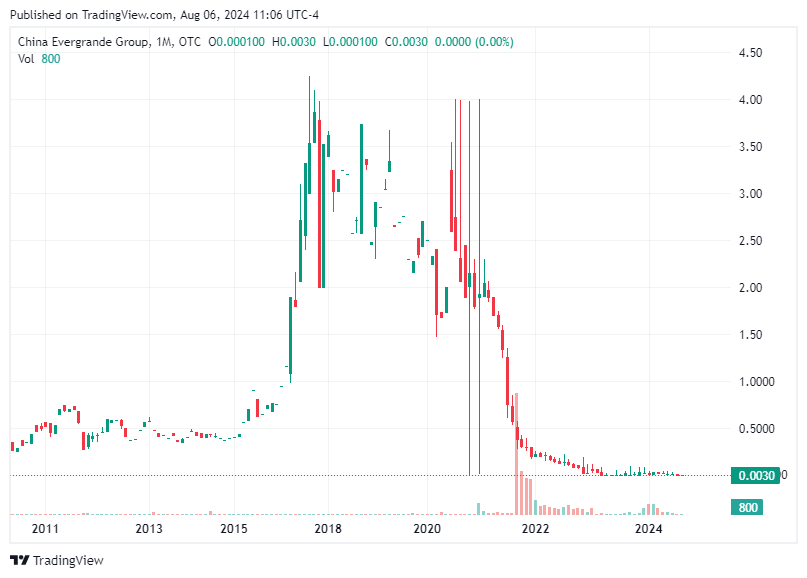Real Estate Developer Giant Targets $6 Billion Recovery From Executives
China Evergrande Aims to Recover $6 Billion From Executives.

Disclaimer: This article is for informational purposes only and should not be taken as financial advice. Readers are encouraged to conduct their own research or consult a financial advisor before making any investment decisions.
Real-time information is available daily at https://stockregion.net
China Evergrande Group, one of the largest real estate developers in the world, has been facing financial challenges due to its enormous debt load. Recently, the company announced that it is targeting seven individuals, including its founder Hui Ka Yan, his ex-wife Ding Yumei, a former chief executive (CEO), and a former chief financial officer (CFO), in an effort to recover a staggering $6 billion.
Historical Context: The Rise and Troubled Path of Evergrande
Founded in 1996 by Hui Ka Yan, Evergrande quickly rose to prominence by capitalizing on China's rapidly expanding property market. Over the years, the company diversified its portfolio, venturing into various sectors including healthcare, electric vehicles, and finance. However, this aggressive expansion was largely funded through debt, leading to a liability mountain that exceeded $300 billion by 2021. The company's debt-fueled growth strategy began to unravel when the Chinese government introduced measures to curb excessive borrowing in the real estate sector. Known as the "three red lines" policy, these regulations aimed to reduce financial risks by limiting the amount developers could borrow based on three distinct financial metrics. Evergrande's inability to meet these requirements triggered a liquidity crisis, raising concerns about its solvency.
In a filing disclosed earlier this year, Evergrande's liquidators revealed that they had initiated legal proceedings in late March against seven defendants. Besides founder Hui Ka Yan, the list includes former CEO Xia Haijun, former CFO Pan Darong, Hui's ex-wife Ding Yumei, and three entities associated with Hui and Ding. The liquidators allege that these individuals received dividends and remuneration totaling $6 billion based on misstated financial statements from 2017 to 2020.
The Hong Kong High Court has ruled in favor of Evergrande's liquidators, granting injunctions that restrain Hui, Ding, and Xia from dealing with, disposing of, or diminishing the value of their worldwide assets up to various prescribed limits. The court lifted confidentiality orders on the injunctions and the proceedings on August 2, bringing the case into the public eye.
China's Real Estate Sector
The ongoing legal battle has implications for various stakeholders, including creditors, investors, employees, and homebuyers. For creditors, the recovery of $6 billion could provide some respite, although it remains uncertain whether the full amount can be reclaimed. Investors, on the other hand, continue to face uncertainty as Evergrande's shares remain suspended until further notice. Employees of Evergrande are also in a precarious position, as the company's financial instability could lead to job losses and unpaid wages. Moreover, countless homebuyers who have invested in Evergrande's unfinished projects are anxious about the completion of their properties.
The China Securities Regulatory Commission (CSRC) has been closely monitoring Evergrande's financial practices. Earlier this year, the CSRC found that Hengda Real Estate, Evergrande's onshore flagship unit, had overstated revenue by a colossal 564 billion yuan ($78 billion) over two years through 2020. This revelation has further tarnished Evergrande's credibility and added to the urgency of the recovery efforts. Evergrande's troubles are not isolated; they reflect broader issues within China's real estate sector. The liquidity crisis faced by Evergrande has led to a ripple effect, impacting other developers who also rely heavily on debt. The Chinese government's regulatory crackdown aims to create a more sustainable and transparent real estate market, but the transition has been challenging for many firms.
Future Prospects and Recovery Efforts
Evergrande's future remains uncertain as it grapples with the daunting task of restructuring its vast debt. The company has been exploring various options, including asset sales, debt-to-equity swaps, and seeking new investors. However, these measures have yet to yield significant results.
The recovery of $6 billion from the targeted executives could potentially provide some financial relief, but it is unlikely to solve all of Evergrande's problems. The company's ability to navigate this crisis will depend on its negotiations with creditors, the outcome of legal proceedings, and its capacity to restore investor confidence.
China Evergrande Group's efforts to recover $6 billion from its executives highlight the severe financial and legal challenges the company faces. With over $300 billion in liabilities and a failed restructuring plan, Evergrande's struggle is far from over. The outcome of the ongoing legal proceedings will be crucial in determining the company's ability to stabilize its finances and continue its operations.
Evergrande's case serves as a stark reminder of the risks associated with excessive leverage and the importance of financial transparency. As the company battles to reclaim lost funds and rebuild its reputation, stakeholders must remain vigilant and informed about the developments in this high-stakes saga.
Disclaimer: This article is for informational purposes only and should not be taken as financial advice. Readers are encouraged to conduct their own research or consult a financial advisor before making any investment decisions.
Real-time information is available daily at https://stockregion.net


